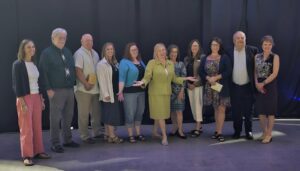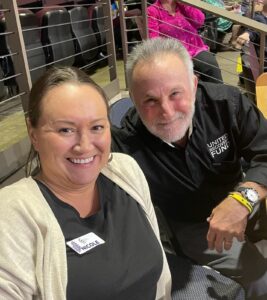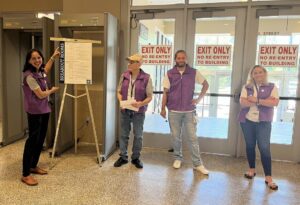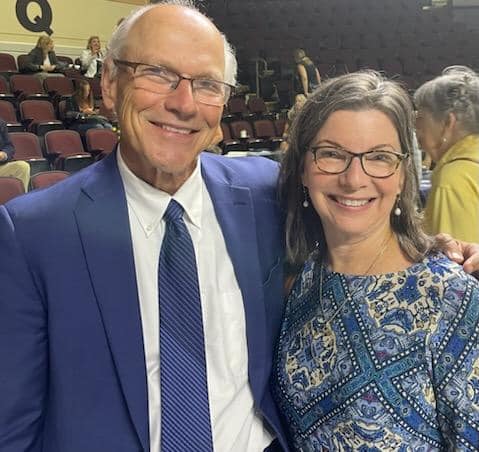Portland Recovery Community Center showed up in a big way to support Gov. Janet Mills 5th Annual Opioid Response Summit, which drew more than 1,300 people to Cross Insurance Arena in Portland.
The summit included keynote speakers, recovery advocates, and leaders across Maine who came together to share ideas and strategies to help Mainers impacted by the opioid epidemic.
The theme of this year’s summit was the Power of Prevention, Focus on Families. A highlight for many in attendance was the breakout sessions with the voices of persons in recovery, featured prominently again this year.
 PRCC organized the voices of recovery in 2019 for the first Summit and again this year. Leslie Clark, executive director of PRCC, said she requested the state to include in its agenda before every workshop that a person in recovery or recovery ally share their experience and hope for recovery. The governor’s office resoundingly said ‘Yes.’
PRCC organized the voices of recovery in 2019 for the first Summit and again this year. Leslie Clark, executive director of PRCC, said she requested the state to include in its agenda before every workshop that a person in recovery or recovery ally share their experience and hope for recovery. The governor’s office resoundingly said ‘Yes.’
This year, 20 people shared 3 to 5 minutes of their recovery journey. Leslie said the stories of recovery uplift us and bring us back to why all this matters.
“It’s amazing! There has been huge transformational ground swell in terms of the unity of policy makers at the national and state level, and most importantly, people in recovery whose voices are being heard,” Leslie said. “They are part of creating the policies and resources that need to be in place for people to get well. This was the vision that we would be not just one voice at a table, but that we would be many voices. We want our recovery community to participate in the development of public policy and civic engagement in a productive way. And that is what we are achieving. We are there to help form the solutions.”
The Governor’s Office of Policy Innovation and the Future published an updated Maine Opioid Response Strategic Plan to coincide with the fifth annual summit.
“What gratified me was seeing how the work we are doing on the ground is in alignment with the state’s strategic plan, and the national agenda for how to solve this problem,” Leslie said. “We are right in alignment with that. We are all singing from the same songbook about what needs to be done, and to me that’s just amazing.”
 The conference kicked off with speakers including Gordon Smith, director of Opioid Response and Sarah Squirrell, director of the Maine Office of Behavioral Health. Maine Attorney General Aaron Frey gave a presentation on how Maine’s Opioid Settlement Funds will be utilized and the work of the Maine Recovery Council.
The conference kicked off with speakers including Gordon Smith, director of Opioid Response and Sarah Squirrell, director of the Maine Office of Behavioral Health. Maine Attorney General Aaron Frey gave a presentation on how Maine’s Opioid Settlement Funds will be utilized and the work of the Maine Recovery Council.
Gov. Janet Mills said in her keynote address that her administration’s focus is stopping deadly drugs from getting on the streets, saving lives, distributing Naloxone across Maine, expanding treatment and recovery programs, especially in rural areas, and preventing substance use disorder before children, young people, and others begin to use these deadly drugs.
Gov. Mills outlined the state’s next steps to address the opioid epidemic, which includes 34 strategies in the areas of infrastructure, public safety, harm reduction, treatment, recovery, and prevention, the theme of the summit.
“Our actions we have taken are the result of close partnerships with many of you here today,” Gov. Mills said. “There is no simple solution to this epidemic but there is hope. This administration will do everything we can to save lives and set people on a path to lifelong recovery.”
The night before the conference, PRCC received a visit from Elizabeth Connolly, assistant director of the Office of Public Health, White House Office of National Drug Control Policy. Elizabeth visited PRCC for a tour of the center and an overview of PRCC’s mission and support services. Elizabeth gave PRCC a shout out during her keynote address at the conference, Gov. Mills 5th Annual Opioid Response Summit,
“I visited the Portland Recovery Community Center, and I was blown out of the water,” Elizabeth told the crowd. “Oh my gosh, all the services that are provided there. The way they are working as the HUB and working with folks in other places. This is a model for other recovery centers. And their work in carceral settings… It was just amazing.”
 The conference was sprawled across the Holiday Inn by the Bay, the Cross Insurance Arena, and MaineHealth building. PRCC volunteers showed up in a big way directing people to breakout sessions and helping people in any way they needed. For some PRCC volunteers, this experience was new and will undoubtedly leave a positive impression for years to come.
The conference was sprawled across the Holiday Inn by the Bay, the Cross Insurance Arena, and MaineHealth building. PRCC volunteers showed up in a big way directing people to breakout sessions and helping people in any way they needed. For some PRCC volunteers, this experience was new and will undoubtedly leave a positive impression for years to come.
“When we say, ‘This is what recovery looks like.’ This is what recovery looks like,” Leslie said. “People who are joyful helping serve their community and helping others find their way.”

